04 May2022
By Matthew Wales

In today’s world, diversity, equity, and inclusion can sometimes feel like simply buzzwords. They are trendy to say, and deemed important to acknowledge strategically, but are the actions taken by academic leaders truly enhancing diversity amongst our faculty and candidates? Is there a collective, shared sense of what equitable practices look like? And most importantly, are the decisions of leaders today creating and cultivating spaces that are inclusive to all?
As a part of its strategic plan, AACTE and its members are committed to increasing the diversity of their faculty and the students they prepare, so that educators more accurately reflect the diversity within PK-12 schools. As such, AACTE firmly believes in the need to continually assist deans, program chairs, and other academic leaders in navigating and managing the ever-changing landscape of diversity, equity, and inclusion within educator preparation. To that end, AACTE is proud to provide session content in both the dean and chair strands of the Leadership Academy that will address the following key questions:
- Why is it important to foster and promote diversity, and develop inclusive environments?
- What cultural implications do I need to attend to in the areas of teaching, research, and service?
- What specific actions are necessary to address the cultural implications in the areas of teaching, research, and service?
Working within job-alike cohorts, attendees will engage in several activities designed to “disrupt” the normal thinking around diversity, equity, and inclusion. Participants will define their own characteristics of what makes an equitable environment, and then with outside collaboration from peers, dig deeper to see just what gaps may need to be filled to create more inclusive practices and spaces. In the end, attendees will leave the session with an action list of practices to implement, which can be customized for their institution.
Don’t miss your chance to participate in this engaging and interactive look at diversity, equity, and inclusion in academic leadership. Join us June 26-30, 2022, at the Renaissance International Plaza Hotel in Tampa, FL, where you can choose from one of three track options
- New Chairs and Academic Leaders – June 26-28
- New and Seasoned Deans – June 28-30
- Full Conference (All Sessions) – June 26-30
Be sure to check out the schedule of content to be offered this year and reserve your spot today for AACTE’s new and improved Leadership Academy experience.
03 May2022
By Michael Rose

National Teacher Appreciation Week is May 1 through May 7, 2022. AACTE celebrates the work of teachers across the country and recognizes the significant contributions our nation’s teachers make in preparing today’s students for tomorrow’s world.
AACTE joins with the American Federation of Teachers and more than 200 other partnering organizations, to thank teachers for “helping every child in America lay the groundwork to build a better life, which starts right in their very own school.” In addition, the campaign recognizes that, “Despite political interference, disrespect for [their] professionalism, and a seemingly endless struggle for resources, [teachers] rise to the occasion to help prepare every child for whatever comes next, and [they] do it with incredible humanity and grace.”
02 May2022
By Eleanor Su-Keene

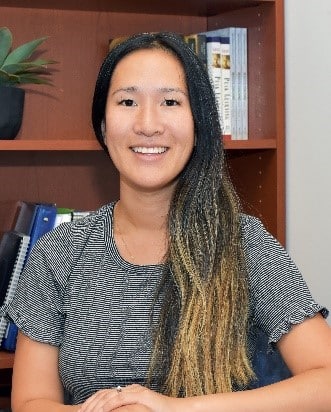
I’m not your model minority. In fact, I spent much of my life contemplating whether I’m actually a minority at all. In the United States, racial socialization runs along a Black/White spectrum, where until recently, Asian American, Native Hawaiians and Pacific Islanders (AANHPI) communities existed outside of mainstream racial dialogue. If I may elaborate. As a society, people move through in different ways, and it is only when you come across barriers or lack the privilege afforded to others based on race, that you experience oppression and injustice firsthand. Asian Americans occupy a contentious, invisible space in which race is operationalized as simultaneously a privilege and a form of discrimination. As Cathy Park Hong wrote in Minor Feelings, “Asians lack presence. Asians take up apologetic space. We don’t even have enough presence to be considered real minorities. We’re not racial enough to be token. We’re so post-racial we’re silicon.”
29 Apr2022
By Kaitlyn Brennan
 This weekly Washington Update is intended to keep members informed on Capitol Hill activities impacting the educator preparation community. The views expressed in this post do not necessarily reflect the views of AACTE.
This weekly Washington Update is intended to keep members informed on Capitol Hill activities impacting the educator preparation community. The views expressed in this post do not necessarily reflect the views of AACTE.
Congress may have been on recess for the past two weeks, but it certainly did not feel like that behind the scenes. There has been a flurry of activity surrounding the President’s FY2023 Budget Request. Education advocates are working diligently to get their appropriations requests to Members — hopeful to see historic increases for education funding making it across the finish line.
The Debate over Student Loan Forgiveness Continues as the Department Cancels $238 Million in Debt for 28,000 Borrowers
On Thursday, President Biden confirmed reports that he is considering canceling “some” amount of federal student loan debt. “I am considering dealing with some debt reduction,” The President said in remarks at the White House. “I am not considering $50,000 debt reduction.”
29 Apr2022
By U.S. Department of Education
During Second Chance Month, the U.S. Department of Education announced actions to help incarcerated individuals access educational programs as part of the Biden-Harris Administration’s broader efforts to support reentry, empower formerly incarcerated persons, enhance public safety, and strengthen our communities and our economy. The Department has invited 73 colleges and universities to participate in the third round of the Second Chance Pell Experiment, an initiative first launched by the Obama-Biden Administration to expand access to Federal Pell Grants for incarcerated individuals enrolled in participating programs. The expansion will bring the total number of schools able to participate in the Second Chance Pell Experiment to 200. The Department is also announcing changes to policies to help incarcerated individuals with defaulted loans, including affirming that incarcerated individuals qualify for a “fresh start,” which returns borrowers with defaulted loans to repayment in good standing and allows them to access programs like the Second Chance Pell Experiment. The Department will also allow incarcerated individuals to consolidate their loans to help them exit default in the long term.
20 Apr2022
By Weade James
 Performance assessments that serve as a gateway to teacher preparation programs (i.e., Praxis Core, similar state-developed assessments) are intended to measure students’ basic skills in reading, writing, and mathematics. While these skills have no correlation to a candidate’s ability to be successful in a preparation program or relationship to effective teaching, many states require educator preparation programs (EPPs) to ascribe to the use of entrance assessments as a perquisite for program admissions.
Performance assessments that serve as a gateway to teacher preparation programs (i.e., Praxis Core, similar state-developed assessments) are intended to measure students’ basic skills in reading, writing, and mathematics. While these skills have no correlation to a candidate’s ability to be successful in a preparation program or relationship to effective teaching, many states require educator preparation programs (EPPs) to ascribe to the use of entrance assessments as a perquisite for program admissions.
The AACTE Consortium for Research-Based and Equitable Assessments (CREA) is examining how cut scores are being set for these assessments and its impact on aspiring teachers and the teacher-of-color pipeline. In its recent infographic, The Impact of Program Entrance Assessments on Aspiring Teachers and the Teacher of Color Pipeline, AACTE highlights key themes and findings from focus groups held with in-service teachers, teacher candidates of color at various institutions, and faculty of historically black colleges and universities (HBCUs).
19 Apr2022
By Margaret Gerry
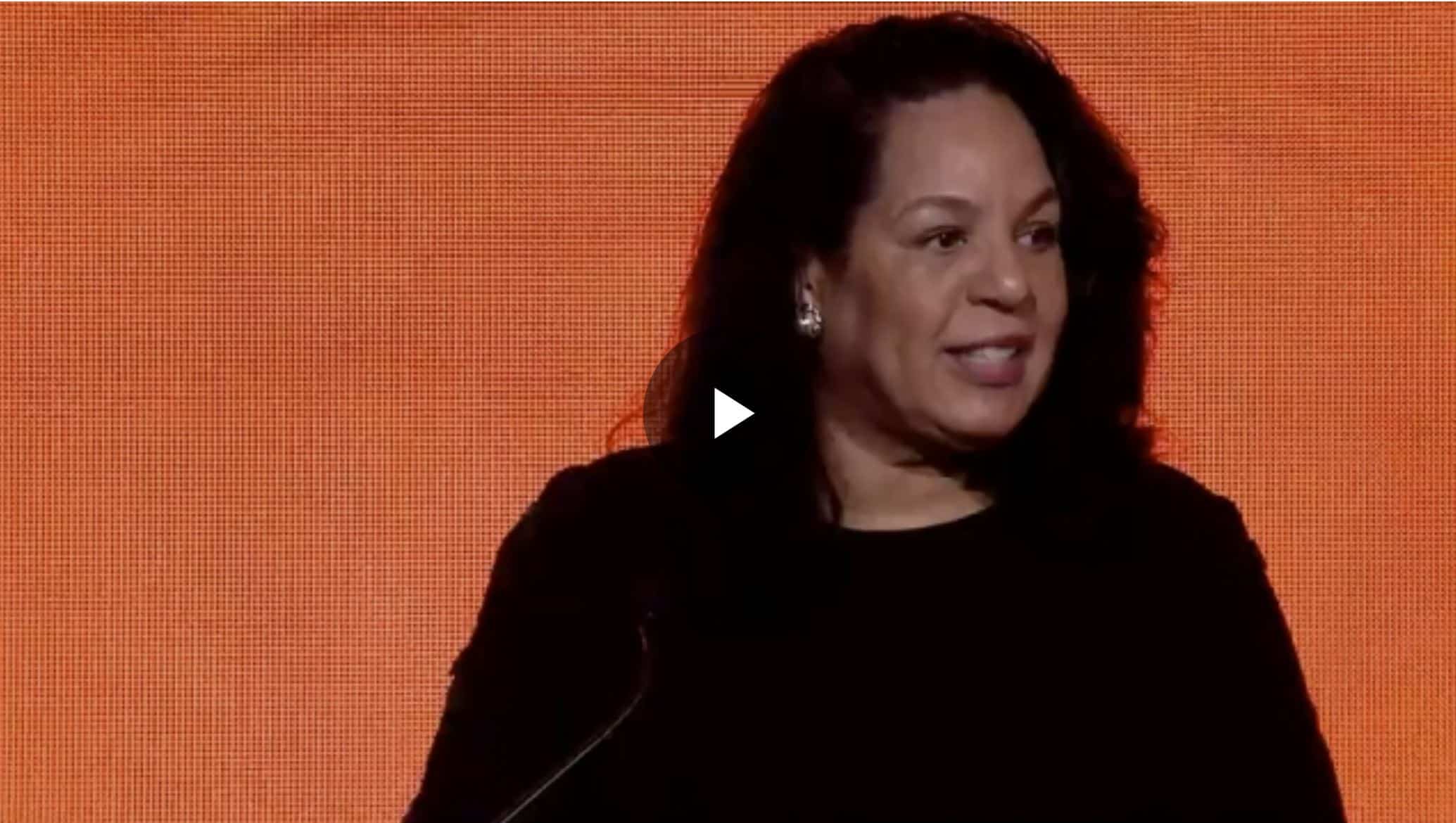 The AACTE 74th Annual Meeting culminated with a closing session keynote address by nationally renowned educator, education policy scholar, and best-selling author, Leslie T. Fenwick, Ph.D. Throughout her career, Fenwick has made significant contributions to the field of education, serving as the dean of Howard School of Education, and currently as AACTE’s dean in residence. In the closing keynote session, Fenwick shared insight and key themes from her book, Jim Crow’s Pink Slip: The Untold Story of Black Principal and Teacher Leadership, and she concluded with a series of recommendations to diversify the nation’s educator workforce and redefine school reform.
The AACTE 74th Annual Meeting culminated with a closing session keynote address by nationally renowned educator, education policy scholar, and best-selling author, Leslie T. Fenwick, Ph.D. Throughout her career, Fenwick has made significant contributions to the field of education, serving as the dean of Howard School of Education, and currently as AACTE’s dean in residence. In the closing keynote session, Fenwick shared insight and key themes from her book, Jim Crow’s Pink Slip: The Untold Story of Black Principal and Teacher Leadership, and she concluded with a series of recommendations to diversify the nation’s educator workforce and redefine school reform.
19 Apr2022
By Christopher M. Claude
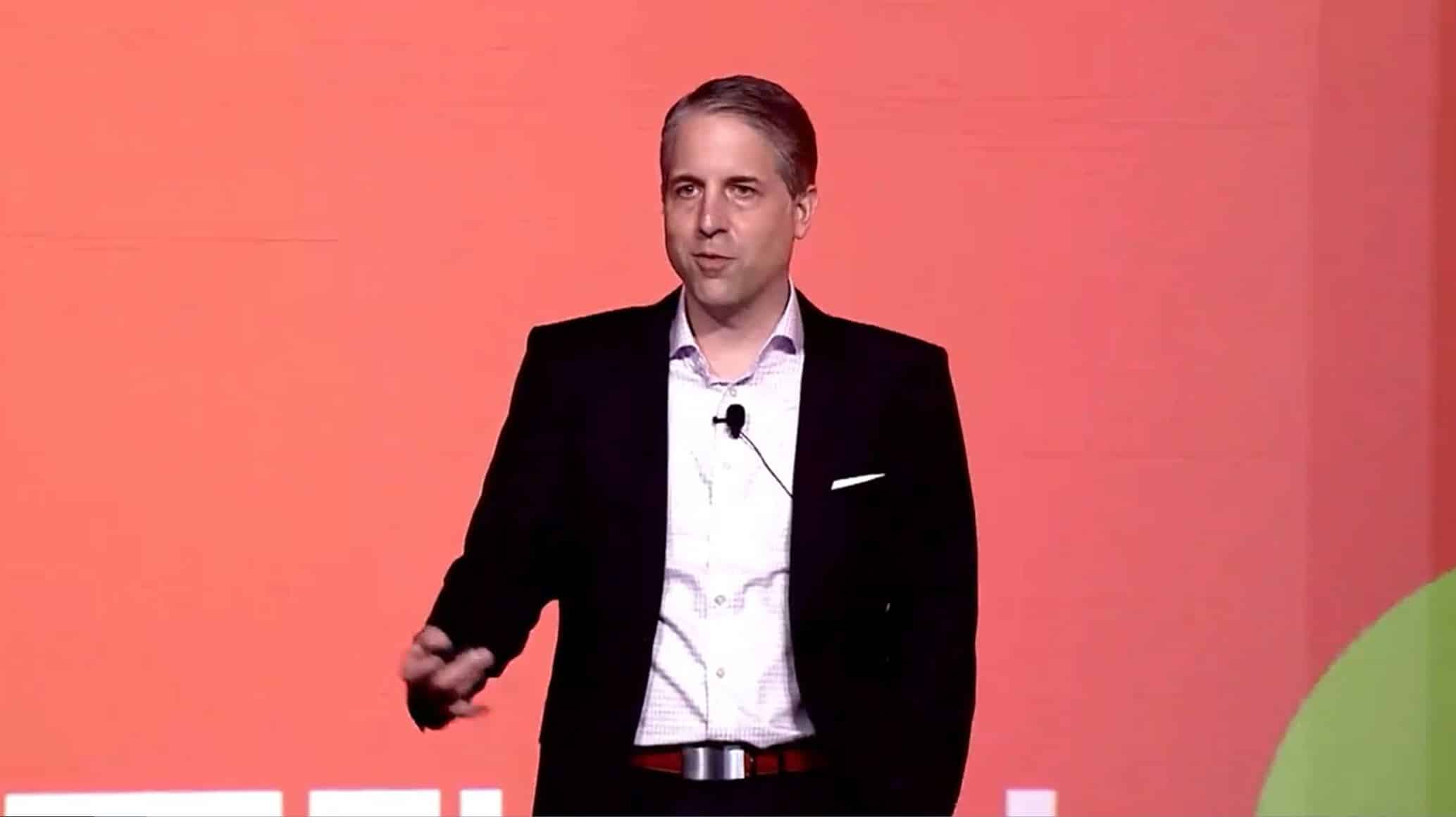 Derek Black J.D., a law professor at the University of South Carolina, is among the nation’s foremost experts in education law and policy. He’s published extensively in prestigious journals and been cited by the Supreme Court of the United States. In his book, Schoolhouse Burning: Public Education and the Assault on American Democracy, Black explored the legal and historical basis for the right to public education.
Derek Black J.D., a law professor at the University of South Carolina, is among the nation’s foremost experts in education law and policy. He’s published extensively in prestigious journals and been cited by the Supreme Court of the United States. In his book, Schoolhouse Burning: Public Education and the Assault on American Democracy, Black explored the legal and historical basis for the right to public education.
According to Black, the inspiration for Schoolhouse Burning came from the teacher strikes in 2018. Seeing tens of thousands of teachers expressing their right to peacefully protest compelled him to “pay homage to all that [educators] are bringing to the American public.” It is with this spirit that he addressed the attendees at AACTE’s Opening Session at it 2022 Annual Meeting.
The guiding question behind Professor Black’s book is simple: are we moving closer to the original vision of public education, or further away from it? That is, his book chronicled the fight for public education. Using historical and legal precedents such as the Northwest Ordinances of 1785 and 1787, The Colored Peoples Convention in Charleston in 1865, and the Brown V. Board of Education decision, Black explained why the state must provide education as a democratic necessity, and how formerly enslaved African Americans were among the key figures in the fight for educational equality for all.
11 Apr2022
By Nicole Dunn

AACTE, in its efforts to revolutionize education, is partnering with Digital Promise to support their work in tackling systems-level transformation that directly address the challenges students face. Digital Promise wants to ensure that each student has equitable access to educators and learning experiences that affirm and honor their identities, expertise, and cultures. Through professional development and its free and open-source tool, the Learner Variability Project LVN), Digital Promise empowers educators to deepen their understanding of learner variability and embrace equitable and inclusive practices that support the whole child.
04 Apr2022
By Kaitlyn Brennan
This weekly Washington Update is intended to keep members informed on Capitol Hill activities impacting the educator preparation community. The views expressed in this post do not necessarily reflect the views of AACTE.
 The Biden-Harris Administration FY2023 Budget Proposal is here and again provides substantial increases for education funding. Your voices are being heard.
The Biden-Harris Administration FY2023 Budget Proposal is here and again provides substantial increases for education funding. Your voices are being heard.
Biden-Harris Administration Unveils FY2023 Budget Proposal
On Monday the White House unveiled the complete version of the Biden-Harris Administration’s full budget proposal for FY2023. The proposal comes just weeks after the President signed into law the $1.5 trillion FY2022 omnibus spending bill, avoiding a full year continuing resolution at the FY2021 levels.
The budget proposal calls for $88.3 billion in discretionary funding to the Department of Education- a $12.9 billion or 17% increase over the 2022 net enacted level.
04 Apr2022
By David Fuentes
This article was originally published in Teachers College Record and is reprinted with permission.
There are deeply ingrained structural inequalities in schools that require immediate action. As antiracist educators, we must ask questions about school equity to disrupt the inequality of school outcomes we continue to see today. Who teaches the students? Who gets new schools? Who graduates from high school, and who goes to college? Who gets labeled and sorted? What can (antiracist) educators do? These questions are profoundly antiracist because they are overwhelmingly multicultural. By asking profoundly antiracist questions about schools today, I highlight areas and issues of schooling that require immediate action, antiracist efforts, to address the inequalities that exist as evidenced by educational statistics. Based on the analysis of school outcomes presented in this research note, it becomes clear that Black, Indigenous, People of Color (BIPOC) students continue to experience disparate school outcomes in America. Such inequalities reveal that BIPOC children are taught by underpaid teachers, learn in schools that are falling apart, are labeled and sorted at disproportionate rates, and endure a curriculum about other people, and generally are being underserved in schools, as evidenced by the school outcomes. Educators must take immediate antiracist actions to ensure that school equity does not continue to be defined by racial inequality.
28 Mar2022
By Nicole Dunn

As another Women’s History Month comes to an end, AACTE wants to acknowledge the achievements of women-identified leaders in educator preparation. The Association kicked off its celebration by asking you, AACTE members, to identify a leader who affected your work as an educator through their mentorship, research, and colleagueship. AACTE is honored to share those responses here and want to congratulate all women members for their contributions to their classrooms and the field each day.
Joan Rhodes, chair, Department of Teaching and Learning and associate professor, Virginia Commonwealth University School of Education
“Dr. Rhodes models skillful leadership and compassion. A transformational leader, she is responsive to the financial and structural needs of the larger institution, while prioritizing the human experience of faculty, staff, and students. She treats department members with dignity, soliciting feedback and input regularly. This collaborative approach led to adapting department practices. Voices previously unheard are now heard and respected. She quietly elevates and lifts all her colleagues and students, creating pathways to leadership roles for all members of the community. She makes me, a junior faculty member, feel seen, heard, and valued while I continue to develop my leadership skills.”
28 Mar2022
By Kaitlyn Brennan
 This weekly Washington Update is intended to keep members informed on Capitol Hill activities impacting the educator preparation community. The views expressed in this post do not necessarily reflect the views of AACTE.
This weekly Washington Update is intended to keep members informed on Capitol Hill activities impacting the educator preparation community. The views expressed in this post do not necessarily reflect the views of AACTE.
We have received confirmation that the president will release his budget request on Monday, March 28 — signaling the official “kick-off” to the FY2023 appropriations season. Advocates are anxiously awaiting to see the line item requests for the Department of Education and will work diligently in the coming months to secure meaningful investments to address the critical shortage of educators and lack of diversity across the field. Stay tuned for more details to come in next week’s Washington Update.
Secretary of Education Miguel Cardona Urges LEAs to Recognize the Critical Importance of Supporting Students with Disabilities
This week, Secretary of Education Miguel Cardona sent an eight page letter to school district officials and parents urging LEAs to recognize the critical importance of supporting students with disabilities. The document comes as many districts are rolling back their COVID-19 mitigation efforts following updated guidance from the Centers for Disease Control and Prevention (CDC). The letter is intended to help school district personnel and families design learning opportunities for all students, including students with disabilities. The document reviews key strategies, including Leveraging the IEP or Section 504 Processes to Ensure Protections are In Place to Protect In-Person Learning; Continuing Use of Layered Prevention Strategies to Keep School Communities Safe; and Ensuring Students Receive Education and Services in the Least Restrictive Environment.
25 Mar2022
By Jacqueline Rodriguez and Nicole Dunn
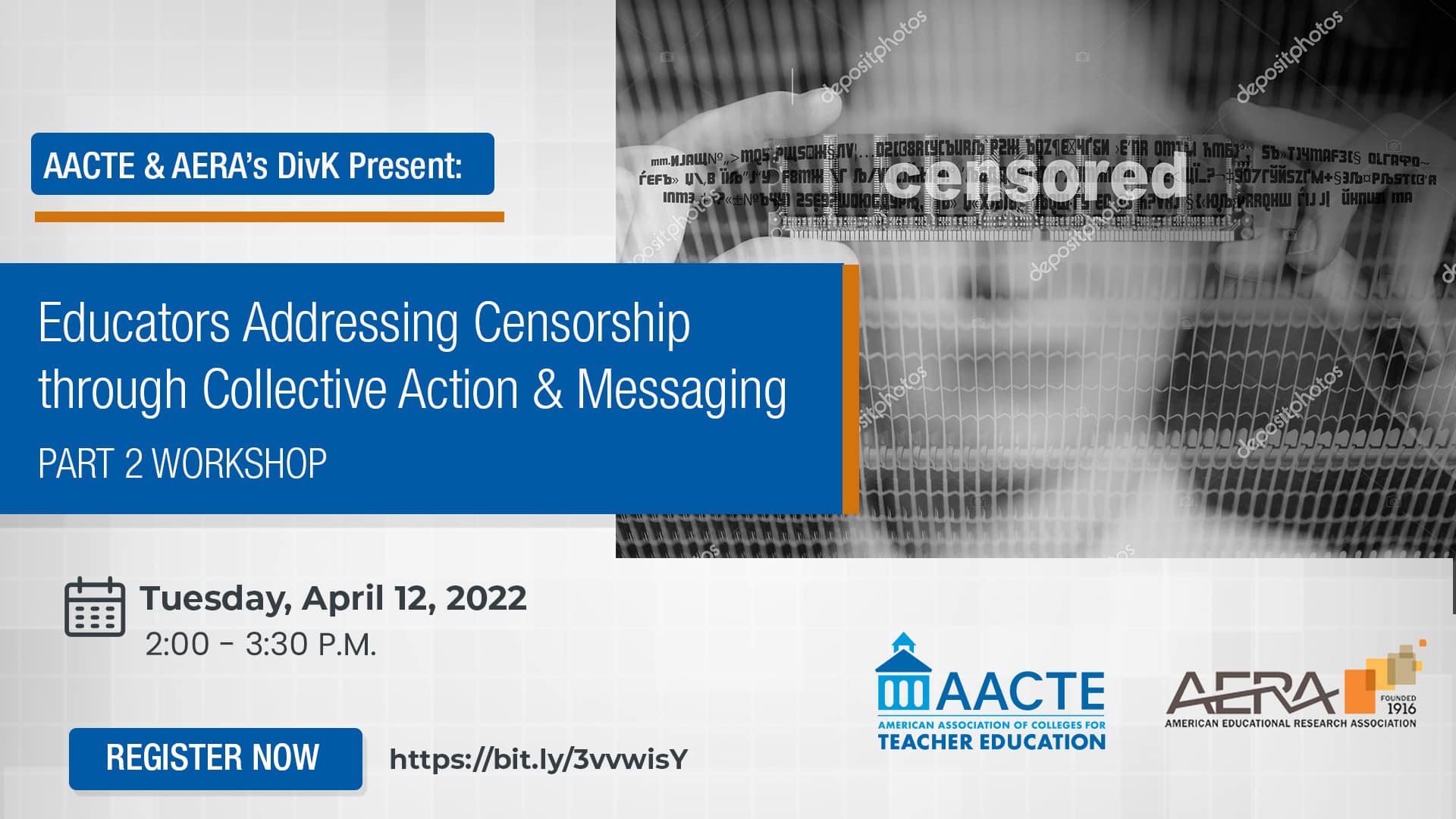 AACTE continues its collaboration with AERA’s Division K: Teaching and Teacher Education to produce an in-depth, scaffolded, three-part series of professional learning opportunities addressing the recent uptick in education censorship across the nation. The first presentation of the series took place as a Deeper Dive session during AACTE’s Annual Meeting in New Orleans. On April 12, AACTE and AERA Division K will co-host a workshop: Educators Addressing Censorship through Collective Action & Messaging, which will include members of our P-20 education system. The third session in our series is a Town Hall taking place during the AERA Conference in late April where Lynn Gangone, AACTE CEO and president will be moderating alongside AERA Executive Director, Felice Levine, and Division K Chair, Dorothea Anagnostopoulos.
AACTE continues its collaboration with AERA’s Division K: Teaching and Teacher Education to produce an in-depth, scaffolded, three-part series of professional learning opportunities addressing the recent uptick in education censorship across the nation. The first presentation of the series took place as a Deeper Dive session during AACTE’s Annual Meeting in New Orleans. On April 12, AACTE and AERA Division K will co-host a workshop: Educators Addressing Censorship through Collective Action & Messaging, which will include members of our P-20 education system. The third session in our series is a Town Hall taking place during the AERA Conference in late April where Lynn Gangone, AACTE CEO and president will be moderating alongside AERA Executive Director, Felice Levine, and Division K Chair, Dorothea Anagnostopoulos.
22 Mar2022
By Jacqueline E. King, Ph.D.
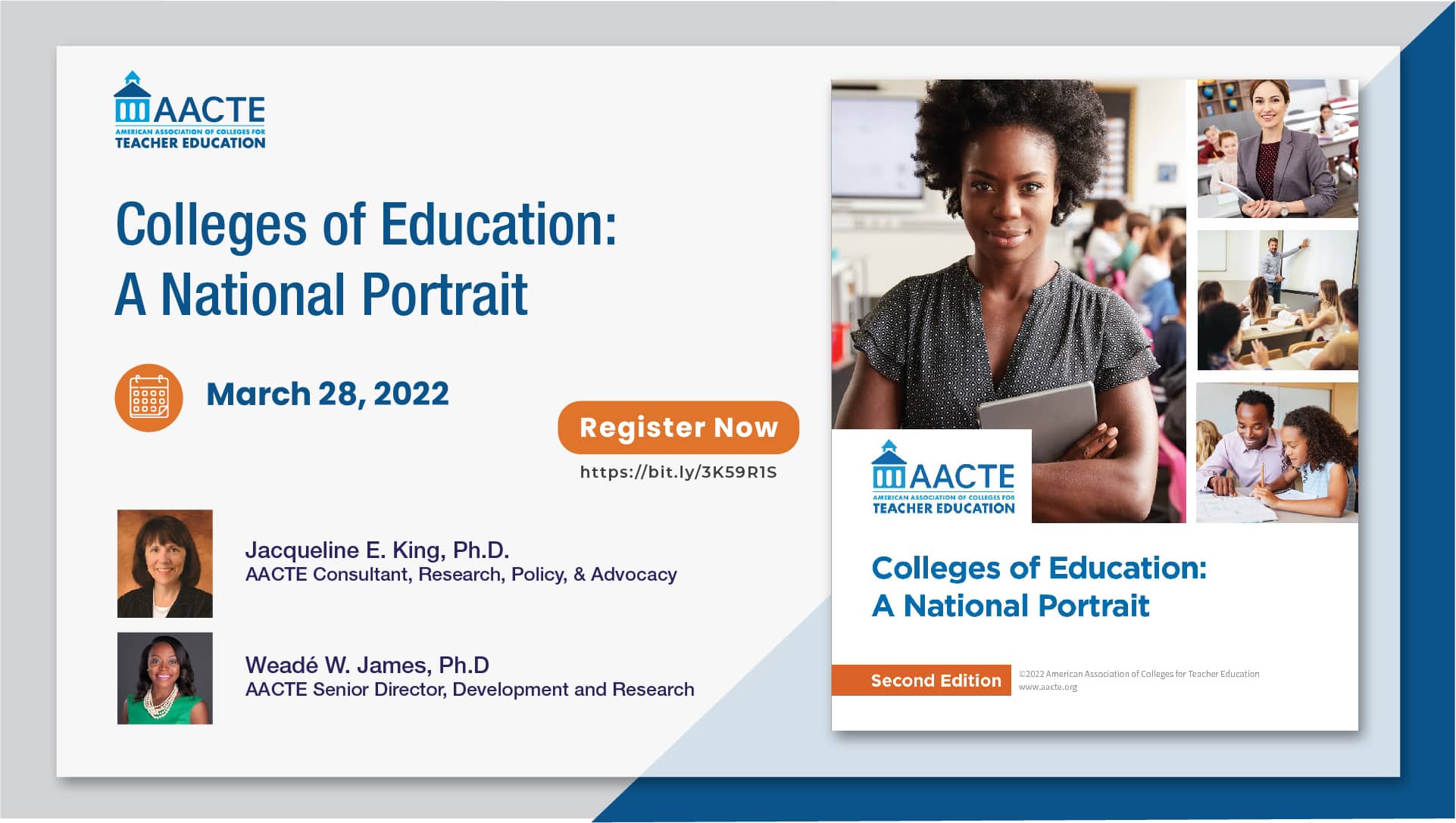 The Colleges of Education: A National Portrait is AACTE’s signature report on schools, colleges, and departments of education. The second edition was released today and AACTE is hosting a webinar to review its findings on Monday, March 28 at 1:00 p.m. ET.
The Colleges of Education: A National Portrait is AACTE’s signature report on schools, colleges, and departments of education. The second edition was released today and AACTE is hosting a webinar to review its findings on Monday, March 28 at 1:00 p.m. ET.
This report is a major vehicle for AACTE to tell the story of colleges of education nationwide and for members to situate their own programs in the broader context of the trends that are shaping the profession. Education preparation program faculty are encouraged to use it to communicate with their institution’s leadership, PK-12 partners, and other key cnstituents about the issues, trends, and challenges impacting educator preparation.
This year, in addition to describing the work of colleges of education, the people who do that work, and the students they serve, the National Portrait includes a special analysis on the important contributions that community colleges make to educator preparation.
Join me and my co-author Weadé James on March 28 for this member-only, informative webinar. Register today.











 This weekly Washington Update is intended to keep members informed on Capitol Hill activities impacting the educator preparation community. The views expressed in this post do not necessarily reflect the views of AACTE.
This weekly Washington Update is intended to keep members informed on Capitol Hill activities impacting the educator preparation community. The views expressed in this post do not necessarily reflect the views of AACTE.  Performance assessments that serve as a gateway to teacher preparation programs (i.e., Praxis Core, similar state-developed assessments) are intended to measure students’ basic skills in reading, writing, and mathematics. While these skills have no correlation to a candidate’s ability to be successful in a preparation program or relationship to effective teaching, many states require educator preparation programs (EPPs) to ascribe to the use of entrance assessments as a perquisite for program admissions.
Performance assessments that serve as a gateway to teacher preparation programs (i.e., Praxis Core, similar state-developed assessments) are intended to measure students’ basic skills in reading, writing, and mathematics. While these skills have no correlation to a candidate’s ability to be successful in a preparation program or relationship to effective teaching, many states require educator preparation programs (EPPs) to ascribe to the use of entrance assessments as a perquisite for program admissions. The AACTE 74th Annual Meeting culminated with a closing session keynote address by nationally renowned educator, education policy scholar, and best-selling author, Leslie T. Fenwick, Ph.D. Throughout her career, Fenwick has made significant contributions to the field of education, serving as the dean of Howard School of Education, and currently as AACTE’s dean in residence. In the closing keynote session, Fenwick shared insight and key themes from her book, Jim Crow’s Pink Slip: The Untold Story of Black Principal and Teacher Leadership, and she concluded with a series of recommendations to diversify the nation’s educator workforce and redefine school reform.
The AACTE 74th Annual Meeting culminated with a closing session keynote address by nationally renowned educator, education policy scholar, and best-selling author, Leslie T. Fenwick, Ph.D. Throughout her career, Fenwick has made significant contributions to the field of education, serving as the dean of Howard School of Education, and currently as AACTE’s dean in residence. In the closing keynote session, Fenwick shared insight and key themes from her book, Jim Crow’s Pink Slip: The Untold Story of Black Principal and Teacher Leadership, and she concluded with a series of recommendations to diversify the nation’s educator workforce and redefine school reform.  Derek Black J.D., a law professor at the University of South Carolina, is among the nation’s foremost experts in education law and policy. He’s published extensively in prestigious journals and been cited by the Supreme Court of the United States. In his book, Schoolhouse Burning: Public Education and the Assault on American Democracy, Black explored the legal and historical basis for the right to public education.
Derek Black J.D., a law professor at the University of South Carolina, is among the nation’s foremost experts in education law and policy. He’s published extensively in prestigious journals and been cited by the Supreme Court of the United States. In his book, Schoolhouse Burning: Public Education and the Assault on American Democracy, Black explored the legal and historical basis for the right to public education.
 The Biden-Harris Administration FY2023 Budget Proposal is here and again provides substantial increases for education funding. Your voices are being heard.
The Biden-Harris Administration FY2023 Budget Proposal is here and again provides substantial increases for education funding. Your voices are being heard.
 This weekly Washington Update is intended to keep members informed on Capitol Hill activities impacting the educator preparation community. The views expressed in this post do not necessarily reflect the views of AACTE.
This weekly Washington Update is intended to keep members informed on Capitol Hill activities impacting the educator preparation community. The views expressed in this post do not necessarily reflect the views of AACTE.  AACTE continues its collaboration with AERA’s Division K: Teaching and Teacher Education to produce an in-depth, scaffolded, three-part series of professional learning opportunities addressing the recent uptick in education censorship across the nation. The first presentation of the series took place as a Deeper Dive session during AACTE’s Annual Meeting in New Orleans. On April 12, AACTE and AERA Division K will co-host a workshop:
AACTE continues its collaboration with AERA’s Division K: Teaching and Teacher Education to produce an in-depth, scaffolded, three-part series of professional learning opportunities addressing the recent uptick in education censorship across the nation. The first presentation of the series took place as a Deeper Dive session during AACTE’s Annual Meeting in New Orleans. On April 12, AACTE and AERA Division K will co-host a workshop:  The Colleges of Education: A National Portrait is AACTE’s signature report on schools, colleges, and departments of education. The
The Colleges of Education: A National Portrait is AACTE’s signature report on schools, colleges, and departments of education. The